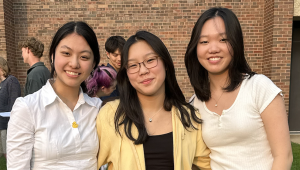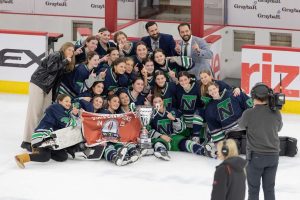Staff Editorial
The social media generation
November 2, 2016
Recently, the school has begun to crack down on VPN use to bypass the schools wifi restrictions. Students have noticed the crack down on VPN use and are frustrated with its interference in their daily life.
However, the school’s crack down on VPNs is not the problem. Specifically, stated in Section 14 of the Technology Acceptable Use Regulations, “Bypassing school security or internet access filtering software is a violation of the usage policy.” By using VPNs you are breaking school policy and endangering yourself to data collection by strangers.
Nevertheless, the problem isn’t VPN use, but the filtering of students’ internet access. Students cannot access some apps, specifically social media apps, like Snapchat and Facebook. The school claims to block some social media sites “in order to ensure student safety and to minimize the distractions available to students during class time,” said Chief Technology Officer Stephanie Helfand.
It is clear that there should be some filters in place for internet use. Students should not be able to access material outlined in the Children’s Internet Protection Act such as obscene material, child pornography and material harmful to minors. Material like that can seriously jeopardize the integrity of an academic institution.
But most social media, like Snapchat, Facebook and Instagram do not fall into this category.
Administrators’ concern with social media apps is that they will distract students from their academics. While this concern is justified, blocking only certain apps will not stop students from being distracted. With this argument of distractability, couldn’t all our non-academic activities be labeled distractions? If the school is so concerned with how social media interrupts academics, then why haven’t they mandated the Winnetka campus to return to study halls because free periods are contributing to distraction?
If these social media apps are a distraction from academics, it is the students’ responsibility and the students themselves, who must be the ones to face the consequences of the distraction. If the student is on her phone in class, than she must encounter the reality of getting a bad grade or other potential repercussions. These consequences due to distraction could also teach students a better work ethic, which will help students learn to take responsibility and benefit them in the future.
Social media can inform and connect us to friends, relatives, classmates far and near. Social media has also been the main source of communication for many service clubs students have been involved in, like Voices in Prevention and Safe Rides. This newspaper utilizes social media to link to articles and report on happenings around New Trier.
Social media is not just a fad or a service that can be banned; we grew up with social media. Social media has become part of this generation’s identity and has become an extension of our lives. To believe that social media can be removed from our lives is not practical.
Despite the many positives of social media and the importance of it in this generation’s daily life, the unfortunate reality is that cyber bullying can occur. However, most social media apps are not built for cyber bullying and almost any platform, social media or not, can be used for bullying. When an app is solely being used for malicious purposes, it is the students’ and the student government’s responsibility to make the administration aware and take actions to stop it.
Most social media apps, specifically Snapchat, Facebook and Instagram, are not comparable.
Students are granted many rights at New Trier, more than most other high school students. And yes, there have been incidents where students have tarnished their trust with administrators on social media, but the actions of individual students should not take away the online rights of the student body. If a few kids are fighting on the playground, we do not take away access to the whole playground.











































